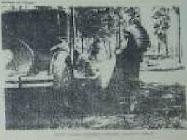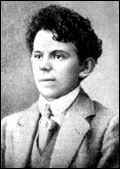The students heading home, it's extra quiet in the library, I have a little more time to babble today.
The winter solstice upon us, snow on the ground, the air bright & milky. Christmas, New Year. I sat in the window booth with my coffee mug, watching the Providence scene go by. Locals I've crossed paths with here since the early 70s... sometimes I recognize them. I turned 61 last May; my adorable grand-daughter arrived in August, I'm officially a grandpa. I'm not officially or unofficially any wiser, as far as I can tell. "Life pierces us with strange relation."
I look back at youth, and marvel at the vigorous perspicuity of instinct and intuition. We simply go and do what we will at that age, the happy geniuses of ourselves. We don't reason excessively about it (though much of that doing involves battles with/against ourselves). Maybe I should have!
But this ain't what I planned to natter on just now.
Have been stuck & struggling with a poem-scroll I'm calling Ravenna Diagram. Maybe I had a little insight the other day, when it occurred to me that perhaps I didn't need to scare up more images, or historical material, so much as change/amplify the modes of discourse. "Modes of discourse" is not the best way of putting it... what I mean is the thematic frameworks, the categories of subject-matter. This is still garbled, sorry!
I am a stubborn writer in many ways. I try to adapt and revamp from within. So, for example, for a long time I've tried to unify actual historical/biographical material by means of obscure allusions and imagery. I do this on purpose. It's a kind of "making-strange", I guess : I love it. The puns, the multivalent words, the alien images. It somehow helps make the poem a distinctive thing-in-itself. Gives it heft.
So I'm focused on presenting a real historical argument or message in Ravenna Diagram. It is analogous to painting a big historical panorama - but using elliptical, obscure means. A patchwork or mosaic. At the same time, I'm trying to give the sense of a journal, a journey, a pilgrimage - for that is, really, what these long ongoing poems are about. They are incremental records of a trip (Whitmanesque notion).
My point here is that is new quasi-insight might help me past an impasse : the daily discouragement and lack of confidence, the loss of purpose. It's the feeling of pointless irrelevance which attacks me sometimes. It's the impasse resulting from a desire to communicate yoked to a confusion about the means. But my insight was this : I have the capacity to address more directly certain philosophical/political/cultural problems, if I can manage to branch out a little from the narrow, iconic-historical symbolism (my usual modus operandi).
I haven't put this too well, and it isn't what I meant to talk about. But it is somewhat related. This notion of combining and coordinating and harmonizing different modes and levels of discourse and subject-matter is not just a private writerly problem. In fact the compositional problem is merely a minor analogue to one of the basic problems facing the world at large. Let's call it the Babel problem.
The Babel problem is not the fact that the peoples of the world speak different languages. It's that the human family cannot even agree on the grounds of reasoning together. Our modes of discourse are at odds : our philosophical/ideological priorities are at war with each other.
If, for example, I want to speak on a theological level - about, say, the character and "personality" of God, or about the premise of transfiguration and eternal life - I am confronted immediately by skepticism grounded not in theology but in ethics or politics. Thus I am opposed (in my own inner debates, as well as in dialogue with others) by arguments like : "How can you take seriously these vaporous notions, these purely speculative claims, when we are confronted every day with massive injustice, oppression, suffering and violence?" So here we have a conflict between disjunctive terms, of subject-matter at cross-purposes. We can't even approach serious disagreements within these intellectual frameworks - say, the contradictory worldviews of various religious faiths - because those frameworks themselves are tangled up with more immediate political disputes and world power-struggles and rivalries. Religious concepts and language are applied, not in order to open channels between the human and the divine, or to liberate and help people in their troubles, but in order to form more cohesive factions (us versus them), or to solidify political/economic oppression by means of manipulative slogans. The games of group identification and mob control are the prime instruments of this planet's exploiters and oppressors. They say to themselves : Let us trouble the community, let us disrupt civil society, let us set our group against theirs, let us point the finger, preach enmity and war : and we will thereby gain wealth and power.
Thus the Babel of a world stymied by violence and exploitation struggles to remain in place. We can't agree on topics for discussion, much less on any conclusions. In this situation it seems important to keep in mind the underlying global unity of the human race. Which reminds me of a certain saying in the New Testament. I can't even recall the proper context (such a proper babbler am I!), but it goes something like this : "I say unto you, every sin shall be forgiven, except the sin against the Holy Spirit. This cannot be forgiven." What does Jesus mean here? Here's my take on it. The Holy Spirit is elsewhere called the Spirit of Truth, the Advocate. I think Jesus is emphasizing that, underneath all the contingent differences, Goodness and Truth are one. They are one for all mankind. Thus when someone calls goodness evil, or causes suffering in the name of God, they are betraying Truth itself. Cloaked in the mantle of goodness, they tyrannize over others. The sin against the truth cannot be forgiven because the lie itself must first be broken and dissolved. Only once this has happened, & only then, perhaps, may the personal consequences for the sinful soul be addressed.
I could be totally off on this reading, I admit : I'm just babbling here. Thinking that the human species as a whole is endowed with conscience, the knowledge of right and wrong (if that conscience has not been eroded or mangled). Meanwhile, simultaneously, our narrow hearts and minds eagerly grab onto answers and solutions : code words and simplistic dogmas, organizing principles which are mere myths, mere tools of oppression. Narrow-minded bigotries, selfish and proud chauvinisms, politic greed. Partisan rancor. Guile & bile.
So the Gospel story of Pentecost - when the Holy Spirit descended as tongues of flame, and everyone suddenly understood each others' languages - seems symbolic of a new order of agreement. An untangling - by means of universal truth - of the discords of warring discourses.
So now I'm sputtering out of time & steam here. To sum up : I've been looking at this parallel between the confusions within an ongoing poem, and the Babel-anarchies of human discord. I haven't even gotten to the theme that lurks behind these ruminations : the seasonal marvel of Christmas and Epiphany. Poetry, at the root, is about metamorphosis and wonder : it is a celebration, a song of rapture. Whence comes this rapture? The glimpse of an infinite, ongoing, eternal, indestructible, everlasting human resurrection - a breaking-in of cosmic Love - beyond all our doubts and dreams. A Christmas miracle, right in front of us all. La vida es sueno (sings the poet)...
12.20.2013
Babel / Pentecost
Labels:
Babel,
conscience,
Holy Ghost,
natural law,
Pentecost,
poetry,
Ravenna Diagram
Subscribe to:
Post Comments (Atom)



No comments:
Post a Comment